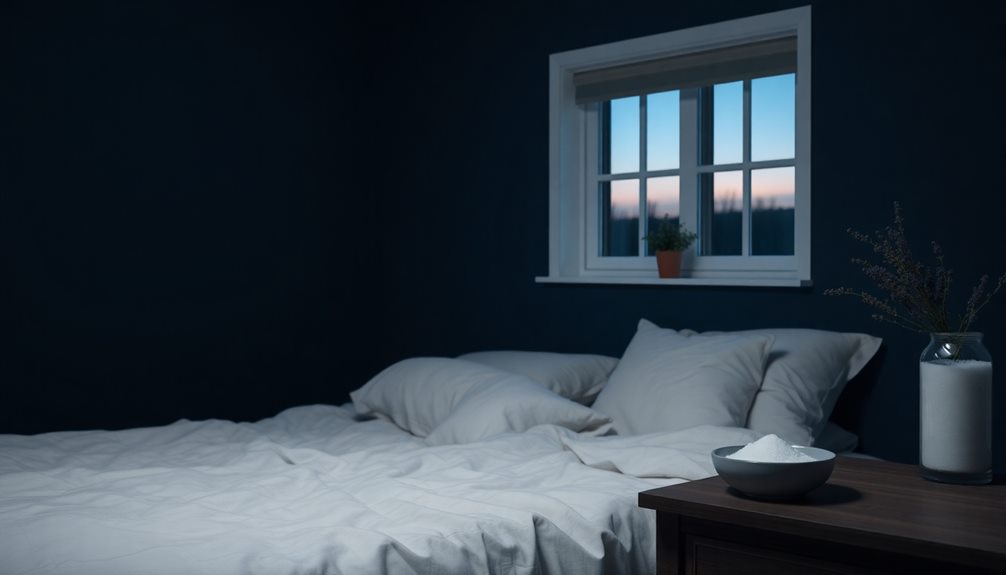You're seeking a restful night's sleep without relying on addictive sleep aids, and luckily, nature has provided three non-habit-forming remedies that can help. Valerian root, a natural sedative, promotes deep sleep by increasing GABA in the brain, while lavender oil creates a serene atmosphere, reducing anxiety and stress. Magnesium, meanwhile, regulates the body's internal clock and promotes restful sleep, alleviating insomnia and restless leg syndrome. By incorporating these natural sleep remedies into your bedtime routine, you'll be well on your way to a peaceful night's sleep – and there's more to explore to get the best results possible.
Nightcap Notes
- Valerian root is a natural sedative that promotes deep sleep by increasing GABA in the brain, regulating sleep and reducing stress and anxiety.
- Lavender oil creates a serene atmosphere, reducing anxiety and stress, and can be used through diffusion, massage, or addition to pillowcases or bath water.
- Magnesium regulates the body's internal clock, relaxes muscles, calms the mind, and regulates melatonin production, reducing symptoms of anxiety and stress.
- These three natural remedies are non-habit-forming and safe for long-term use, providing a restful night's sleep without the risk of addiction.
- Start with small doses and gradually increase as needed to gauge individual reactions to these natural sleep remedies.
Valerian Root for Deep Sleep

Tap into the calming effects of valerian root, a natural sedative that's been used for centuries to promote deep sleep.
This herb is a game-changer for you if you struggle with insomnia or restlessness. Valerian root works by increasing the amount of gamma-aminobutyric acid (GABA) in your brain, a neurotransmitter that helps regulate sleep.
As a result, you'll experience a decrease in stress and anxiety, making it easier to fall asleep and stay asleep.
You can consume valerian root in various forms, such as supplements, teas, or tinctures.
If you're new to valerian root, start with a small dose to see how your body reacts. You can gradually increase the dosage as needed.
Some people experience a sedative effect within 30 minutes of consumption, while others may need to wait a few hours.
Be patient, and you'll soon be enjoying a restful night's sleep.
Valerian root is a safe and non-habit-forming natural sleep remedy that can be used long-term, making it an excellent addition to your sleep routine.
Lavender Oil for Relaxation
Your bedroom should be a sanctuary, and lavender oil can help create that serene atmosphere.
You can use it to unwind and prepare your body for a restful night's sleep. Lavender oil has a calming effect on the mind and body, reducing anxiety and stress that can keep you awake at night.
To create a relaxing environment, try these methods to incorporate lavender oil into your bedtime routine:
- Diffuse it: Add a few drops of lavender oil to a diffuser, and let the calming aroma fill your bedroom.
- Use it in a massage: Mix a few drops of lavender oil with a carrier oil like coconut or olive oil, and give yourself a gentle massage before bed.
- Add it to your pillow: Place a few drops of lavender oil on your pillowcase or add a lavender sachet to your pillow to inhale the calming scent as you drift off to sleep.
- Include it in a bath: Add lavender oil to your bath water for a relaxing soak before bed, promoting a good night's sleep.
Magnesium for Better Slumber

As you've created a peaceful atmosphere with lavender oil, you can further enhance your sleep quality by addressing a common deficiency that might be disrupting your rest.
Magnesium, an essential mineral, plays a vital role in regulating your body's internal clock and promoting a restful night's sleep. When you're magnesium-deficient, you may experience insomnia, restlessness, and frequent awakenings.
Taking magnesium supplements or applying topical magnesium creams can help alleviate these issues. Magnesium helps relax your muscles, calm your mind, and regulates your body's melatonin production.
It also reduces symptoms of anxiety and stress, making it easier to fall asleep and stay asleep. Additionally, magnesium can help reduce symptoms of restless leg syndrome, which can disrupt your sleep patterns.
Frequently Asked Questions
Can I Use Natural Sleep Remedies if I'm Already on Medication?
You're wondering if it's safe to use natural sleep remedies while taking medication.
That's a great question! Generally, it's possible to combine natural remedies with medication, but you need to be cautious.
Consult your doctor or pharmacist to guarantee the natural remedy won't interact with your medication or worsen any underlying conditions.
They can help you make an informed decision and adjust your treatment plan accordingly.
Always prioritize your health and safety!
Do Natural Sleep Aids Work for People With Insomnia?
Are you tossing and turning, wondering if natural sleep aids can tame your insomnia?
Well, the good news: they can! While crucial to consult your doctor, many natural sleep aids have been shown to improve sleep quality for people with insomnia.
You might find relief with melatonin, valerian root, or a relaxing bedtime routine. Remember, it's all about finding what works for you.
Can I Mix Multiple Natural Sleep Remedies for Better Results?
You're wondering if combining multiple natural sleep remedies will improve your sleep quality.
Generally, it's okay to mix and match, but be cautious not to overdo it. Start with small doses of each remedy and monitor how your body reacts.
Some natural sleep aids can interact with each other, so crucially necessary to research potential interactions before creating your own sleep cocktail.
You'll need to experiment and find the right blend that works for you.
How Long Does It Take to See Results From Natural Sleep Remedies?
Oh, you're wondering when you'll finally get some shut-eye?
Well, let's be real, you've probably been scrolling through your phone for hours, comparing your sleep schedule to that of a sloth's.
Anyway, back to your question. Natural sleep remedies can take some time to kick in, but don't worry, it's not like you're waiting for a unicorn to appear.
Typically, you'll start to see results within 1-4 weeks, but it depends on your body and the remedies you're using.
Are Natural Sleep Remedies Safe for Pregnant or Breastfeeding Women?
You're probably wondering if natural sleep remedies are safe for you and your baby if you're pregnant or breastfeeding.
Generally, you'll want to exercise caution and consult your healthcare provider before trying any new remedies.
Some natural sleep aids, like melatonin and valerian root, haven't been extensively studied in pregnant or breastfeeding women, so it's best to err on the side of caution.
Always prioritize your health and your baby's well-being by getting personalized advice from a medical professional.
Conclusion
You've tried the pills, the potions, and the pricey gadgets, but still, you're wide awake at 3 am. It's time to ditch the quick fixes and opt for natural remedies that'll become your new sleep BFFs. Valerian root will plunge you into deep sleep, lavender oil will calm your racing mind, and magnesium will regulate your body's internal clock. With these three natural wonders, you'll be sleeping like a baby in no time – and waking up feeling refreshed, renewed, and ready to take on the day.




